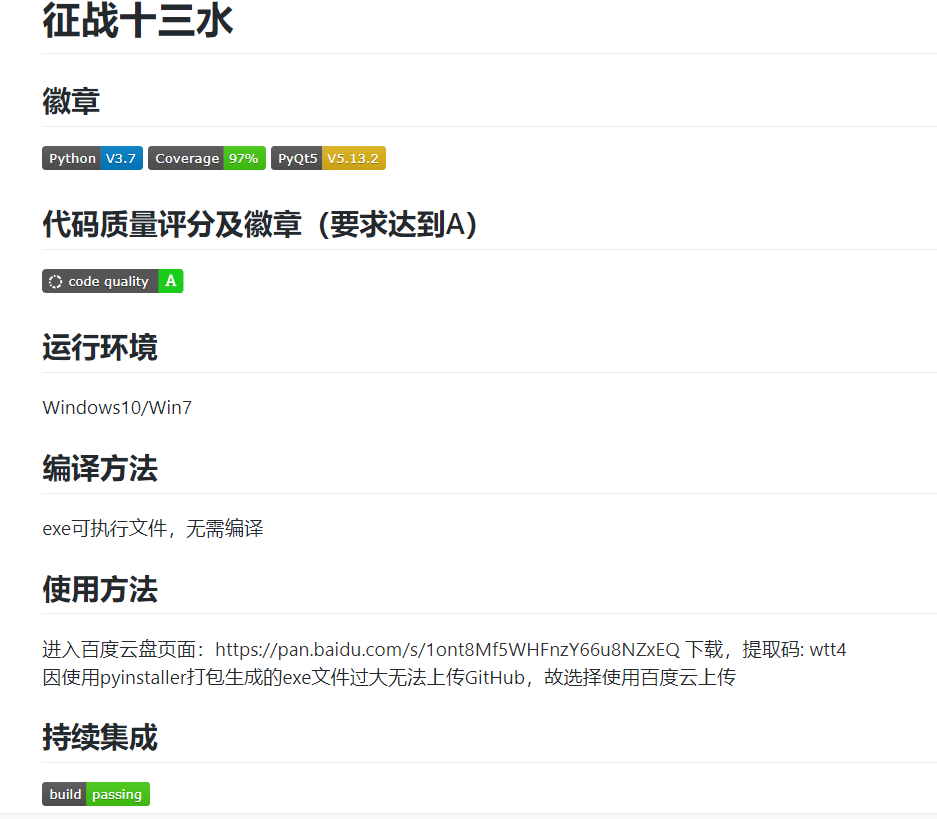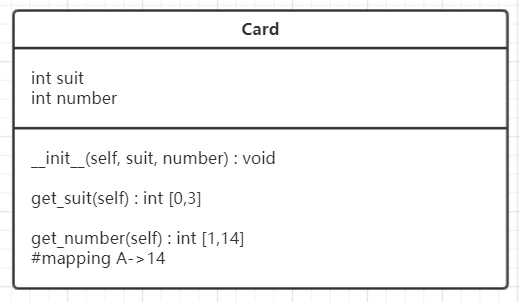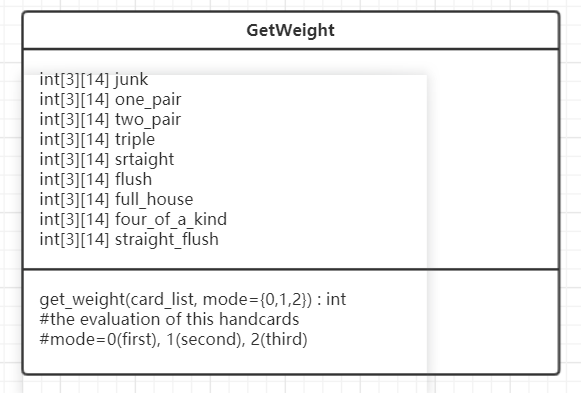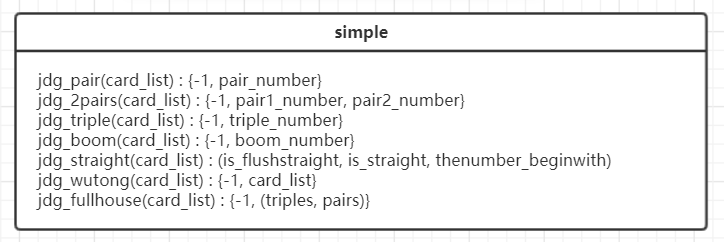0、UI设计
- 演示视频:征战十三水V3.0 UI演示
- GitHub规范:





1、队友链接
- 曾世缘: FormerAutumn
- 队员本次作业博客: 地址
- Fork的仓库地址: Seeclong
2、分工
- 我负责UI的编写以及在前端加入api接口与界面交互相连接
- 出牌算法大部分由大哥完成,我负责了其中特殊牌型的判断
3、PSP表格
| PSP2.1 | Personal Software Process Stages |
预估耗时(分钟) | 实际耗时(分钟) |
|---|---|---|---|
| Planning | 计划 | 30 | 40 |
| · Estimate | · 估计这个任务 需要多少时间 |
10 | 20 |
| Development | 开发 | 960 | 1250 |
| · Analysis | · 需求分析 (包括学习新技术) |
120 | 240 |
| · Design Spec | · 生成设计文档 | 30 | 40 |
| · Design Review | · 设计复审 | 30 | 20 |
| · Coding Standard | · 代码规范 (为目前的开发 制定合适的规范) |
30 | 30 |
| · Design | · 具体设计 | 60 | 40 |
| · Coding | · 具体编码 | 480 | 360 |
| · Code Review | · 代码复审 | 30 | 40 |
| · Test | · 测试(自我测试, 修改代码,提交修改) |
180 | 480 |
| Reporting | 报告 | 170 | 270 |
| · Test Repor | · 测试报告 | 90 | 120 |
| · Size Measurement | · 计算工作量 | 20 | 30 |
| · Postmortem & Process Improvement Plan |
· 事后总结, 并提出过程改进计划 |
60 | 120 |
| 合计 | **1160 ** | 1560 |
4、解题思路描述与设计实现说明
网络接口的使用
def login ():#登陆
conn = HTTPSConnection("api.shisanshui.rtxux.xyz")
payload = "{"username":""+ login_user +"","password":""+login_password+""}"
headers = {'content-type': "application/json"}
conn.request("POST", "/auth/login", payload, headers)
res = conn.getresponse()
data = res.read()
flag =loads(data.decode("utf-8"))
if flag["status"]== 0:
global token
global player_id
token = flag["data"]["token"]
player_id = flag["data"]["user_id"]
def regs():#注册
login_user = self.lineEdit_2.text()
login_password = self.lineEdit_3.text()
conn = HTTPSConnection("api.shisanshui.rtxux.xyz")
payload = "{"username":"" + login_user + "","password":"" + login_password + ""}"
headers = {'content-type': "application/json"}
conn.request("POST", "/auth/register", payload, headers)
res = conn.getresponse()
data = res.read()
flag = loads(data.decode("utf-8"))
print(flag)
if flag["status"] == 0:
self.box = QMessageBox(QMessageBox.Question, '提示', '注册成功,请登录!')
yes = self.box.addButton('确定', QMessageBox.YesRole)
self.box.show()
else:
self.box = QMessageBox(QMessageBox.Question, '提示', '该账号已被注册,请重新输入!')
yes = self.box.addButton('确定', QMessageBox.YesRole)
self.box.show()
self.lineEdit_3.clear()
self.lineEdit_2.clear()
def get_battle():#开启牌局
import requests
url = "https://api.shisanshui.rtxux.xyz/game/open"
headers = {'x-auth-token': token}
response = requests.request("POST", url, headers=headers)
return response.text
def decode_data(data):#解码
data_dict = json.loads(data)
#print(data_dict)
system_cards = data_dict["data"]["card"]
nw_id = data_dict["data"]["id"]
print(system_cards)
return (nw_id, system_cards)
思路描述
- 首先,数据规模为$n=13$很容易想到枚举算法(大概是$O(13^{5} * 8^{5}$)?
貌似也没有限时),只要暴力枚举前中墩的情况即可,因 为前中墩枚举结束后,剩余牌自动归为前墩。 - 其次,对于枚举结束之后的三墩,先进行合法性检测,即三墩需满足:前墩$lt$中墩$lt$后墩
等号取不到 - 再者,对于合法的一组手牌,我们算出这组牌赢的概率的估计值。对,是概率的估计值,那么如何计算?因为我们偷到了一个权重数组,同时,我们维护一个大小为25的大根堆
队友说25吉利,显然最后堆顶的牌组就是我们考虑的最优组合。 - 最后,发到服务器,等待出分。
设计实现说明
- 爆搜或者10重for的嵌套。简单粗暴,除了久一点,没什么问题。
- 爆搜或者5重for,先选出后墩,再选出中墩。即后中墩是分开选择的。显然可以出解,而且比上一种方法快很多。但是,会出现倒水的情况,即无法保证三墩的大小关系。
- 先搜模式,匹配原始牌组,最后出牌。
- AI算法,笔者没有头绪。
- 最后选择了方法3
因为一开始写的是方法2,发现倒水了,就被队友说服去写方法3了,而至于为什么不写方法1,因为方法1时间复杂度太高了$O(!)$,关于方法3的实现,请看官移步开头链接查看。
类图




流程图

5、关键代码解释
- 最初一个简(T)单(到)粗(无)暴(边)的爆搜,直接否掉,这就不能算是个解决方案,实在是太缓慢了。而接下来是一个暴力+贪心的版本。
def dfs(card_list, nw, state):
if ( nw == s ):
ct = 0
for i in range(len(state)):
if ( state[i] == 0 ):
state[i] = 1
hands.append(card_list[i])
state[i] = 0
ct += 1
print(hands)
header = hands[:f]
middle = hands[f:s]
tailer = hands[s:t]
#print(hands)
#print(header); print(middle); print(tailer)
ret = chk(header, middle, tailer)
if ( ret[0] == 1 ):
if ( len(q) >= hyper_n ):
if ( q[0].weight < ret[1] ):
heapq.heappushpop(q, HandCard(hands, ret[1]))
else:
heapq.heappush(q, HandCard(hands, ret[1]))
while (ct>0):
hands.pop()
ct -= 1
return
for i in range(len(state)):
if ( state[i] == 0 ):
state[i] = 1
hands.append(card_list[i])
dfs(card_list, nw+1, state)
hands.pop()
state[i] = 0
hyper_n = 10
f = 3
s = 8
t = 13
q = []
hands = []
heapq.heapify(q)
dfs(cards, 0, np.zeros(len(cards)))
- 然后是我们真正采用的算法。暴力枚举13张牌可能组成的牌型,从单张(junks)到顺子(straights),每种牌型从大到小排序,再从中枚举组合出后中前墩的可能出牌模式,最后枚举判断是否合法即可,如若合法则加入丢入小根堆中维护,最后小根堆弹出至空的最后一组出牌即为所求。因为每部分都不短,还请看官移步文首的仓库品鉴(文件名为:_AutoRecommend.py)
def RecommendHands( card_list ):
sz = len(card_list)
q = []
heapq.heapify(q)
nw_hands = []
#last O(n^5) using the brute force to enumerate the combination of the last hands
for i in range(0,sz,1):
nw_hands.append(card_list[i])
for j in range(i+1,sz,1):
nw_hands.append(card_list[j])
for k in range(j+1,sz,1):
nw_hands.append(card_list[k])
for g in range(k+1,sz,1):
nw_hands.append(card_list[g])
for t in range(g+1,sz,1):
nw_hands.append(card_list[t])
_c = nw_hands; _w = get_weight(_c, 2)
heapq.heappush(q, Hands(_c, -_w))
if len(q) > hyper_n:
_ = heapq.heappop(q)
nw_hands.pop()
nw_hands.pop()
nw_hands.pop()
nw_hands.pop()
nw_hands.pop()
last_hands = []; middle_hands = []; header_hands = []
while len(q)>0:
last_hands.append(heapq.heappop(q))
#last_hands = [ ([(1,1),(1,2),(1,3),(1,4),(1,5)],weight), (), (), ... () ].dtype = Hands([(),()],w)
for _ in last_hands:
#fir every last_hands choose the middle_hands and header_hands
tp_card_list = card_list.copy()
for i in _.list:
for j in range(len(tp_card_list)):
if tp_card_list[j] == i:
tp_card_list.pop(j)
break
#now tp_card_list contain only 8 cards for middle and header
sz = len(tp_card_list)
for i in range(0,sz,1):
nw_hands.append(tp_card_list[i])
for j in range(i+1,sz,1):
nw_hands.append(tp_card_list[j])
for k in range(j+1,sz,1):
nw_hands.append(tp_card_list[k])
for g in range(k+1,sz,1):
nw_hands.append(tp_card_list[g])
for t in range(g+1,sz,1):
nw_hands.append(tp_card_list[t])
_c = nw_hands; _w = get_weight(_c, 1)
heapq.heappush(q, Hands(_c, -_w))
if len(q) > hyper_n:
_ = heapq.heappop(q)
nw_hands.pop()
nw_hands.pop()
nw_hands.pop()
nw_hands.pop()
nw_hands.pop()
while len(q)>0:
X = heapq.heappop(q)
middle_hands.append(X)
tp2_card_list = tp_card_list.copy()
szz = len(middle_hands)
for i in middle_hands[szz-1].list:
for j in range(len(tp2_card_list)):
if i == tp2_card_list[j]:
tp2_card_list.pop(j)
break
_c = tp2_card_list; _w = get_weight(tp2_card_list, 0)
header_hands.append(Hands(_c, -_w))
my_hands = []
for lst in last_hands:
for j in range(hyper_n):
my_hands.append( [(header_hands[j].list, header_hands[j].weight),
(middle_hands[j].list, middle_hands[j].weight),
(lst.list, lst.weight)] )
#for i in my_hands:
# print(i)
return my_hands
#middle O(n^5) using the brute force to enumrate the combination of the middle hands
#first the rest, no choise to choose
- 下面是做UI实现时将json转化成表格的代码
#从api请求返回的排行榜数据
# 将json格式转换成单元格内容
item = [(j, c, data[c].values()) for j in range(3) for c in range(len(data))]
for v in item:
#print('行下标%s,列下标%s,值:%s' % (v[1], v[0], list(v[2])[v[0]]))
newitem = QTableWidgetItem(str(list(v[2])[v[0]]))
newitem.setTextAlignment(Qt.AlignHCenter | Qt.AlignBottom)
if v[0]==1 or v[0]==0:
self.tableWidget.setItem(v[1], v[0]+1, newitem)
else:
self.tableWidget.setItem(v[1], v[0]-2, newitem)
6、性能分析与改进
ncalls tottime percall cumtime percall
64 0.001 0.000 15.890 0.248 Algorithm_fight.py:142(get_battle)
32 0.030 0.001 8.021 0.251 Algorithm_fight.py:155(decode_data)
32 0.001 0.000 3.058 0.096 Algorithm_fight.py:168(my_choose)
800 0.000 0.000 0.000 0.000 Algorithm_fight.py:180(<lambda>)
32 0.001 0.000 7.483 0.234 Algorithm_fight.py:204(send_2_system)
32 0.055 0.002 26.529 0.829 Algorithm_fight.py:221(_start)
1 0.000 0.000 26.530 26.530 Algorithm_fight.py:239(main)
416 0.000 0.000 0.000 0.000 Algorithm_fight.py:29(chg)
1 0.000 0.000 0.000 0.000 Algorithm_fight.py:37(Hands)
50944 0.019 0.000 0.025 0.000 Algorithm_fight.py:38(__init__)
292872 0.034 0.000 0.034 0.000 Algorithm_fight.py:42(__lt__)
32 0.125 0.004 3.056 0.096 Algorithm_fight.py:49(RecommendHands)
1 0.000 0.000 26.767 26.767 Algorithm_fight.py:7(<module>)
1 0.000 0.000 0.000 0.000 GetWeight.py:7(<module>)
50944 0.240 0.000 2.790 0.000 GetWeight.py:99(get_weight)
参数解释:
- ncalls:表示函数调用的次数。
- tottime:表示指定函数的总的运行时间,除掉函数中调用子函数的运行时间。
- percall:(第一个 percall)等于 tottime/ncalls。
- cumtime:表示该函数及其所有子函数的调用运行的时间,即函数开始调用到返回的时间。
- percall:(第二个 percall)即函数运行一次的平均时间,等于 cumtime/ncalls。
- filename:lineno(function):每个函数调用的具体信息
消耗最大的函数:
def AutoRecommend(tp_cards, junks, pairs, triples, booms, straights, flushs, _2_pairs, _32_tps):
_third = booms + _32_tps + flushs + straights + triples + _2_pairs + pairs + junks
_second = booms + _32_tps + flushs + straights + triples + _2_pairs + pairs + junks
_first = triples + pairs + junks
nw_cards = tp_cards.copy()
nw_cards.sort(key=lambda x:-x[1])
#print("nw_cards = ", nw_cards)
q = []
hyper_n = 20
my_weight = [1/5, 2/5, 2/5]
heapq.heapify(q)
for i in _third:
#print("i = ",i)
nwcs = nw_cards.copy()
#print("nwcs0 ", nwcs)
tail = i.copy()
for ii in tail:
nwcs.remove(ii)
tp_nwcs0 = nwcs.copy()
#print("nwcs after ii ", nwcs)
tp_tail = tail.copy()
for j in _second:
nwcs = tp_nwcs0.copy()
#print("j = ",j)
tail = tp_tail.copy()
mid = j.copy()
flg = 1
for jj in mid:
if ( jj in nwcs ):
nwcs.remove(jj)
else:
flg = 0
break
if ( flg == 0 ):
continue
tp_nwcs1 = nwcs.copy()
#print("nwcs = ", nwcs)
#print("nwcs after jj ", nwcs)
tp_mid = mid.copy()
for k in _first:
nwcs = tp_nwcs1.copy()
#print("k = ",k)
tail = tp_tail.copy()
mid = tp_mid.copy()
head = k.copy()
flg = 1
for kk in head:
if ( kk in nwcs):
nwcs.remove(kk)
else:
flg = 0
break
if ( flg == 0 ):
continue
#print("nwcs the rest ", nwcs)
#print("nw_cards_0 = ", head, mid, tail)
#complete the head
#print(head); print(mid); print(tail)
tpp = nw_cards.copy()
#print("tpp = ", tpp)
for hd in head:
tpp.remove(hd)
for mi in mid:
tpp.remove(mi)
for tl in tail:
tpp.remove(tl)
pos = 0
while ( pos < len(tpp) ):
if ( len(head) < 3 and pos < len(tpp) ):
head.append(tpp[pos])
pos += 1
if ( len(mid) < 5 and pos < len(tpp) ):
mid.append(tpp[pos])
pos += 1
if ( len(tail) < 5 and pos < len(tpp) ):
tail.append(tpp[pos])
pos += 1
w_h, w_m, w_t = get_weight(head,0), get_weight(mid,1), get_weight(tail,2)
nw_w = (np.array([w_h,w_m,w_t])*np.array(my_weight)).sum()
#print("nw_cards_1 = ", head, mid, tail)
chk_val = chk_ordered(head, mid, tail)
if ( chk_val[0] == 1 ):
if ( len(q) < hyper_n ):
heapq.heappush(q,HandCard(head+mid+tail, nw_w))
else:
if ( nw_w > q[0].weight ):
heapq.heappushpop(q, HandCard(head+mid+tail, nw_w))
result_cards = []
while ( len(q) > 0 ):
result_cards.append(heapq.heappop(q))
ret = result_cards[len(result_cards)-1].list
return ret
改进思路:
- 其实,撇开网络请求,自我感觉完成得还是不错的。
- 改进方面,不断推翻前面的方案,最终在临近ddl的时候灵光一现,找到了省时方便又合理的贪心组合解决方法。
- 改进的时候就是看时间是否满足条件,通过算法的优化减小时间的耗费。
- 从暴搜到简单搜索到牌型贪心组合。枚举13张牌可能组成的牌型,从单张(junks)到顺子(straights),每种牌型从大到小排序,再从中枚举组合出后中前墩的可能出牌模式,最后枚举判断是否合法即可。
7、单元测试
构造思路
- 使用unittest.TestSuite()
- 按牌型顺序进行判牌单元测试
- pair 2pairs triple boom straight flush fullhouse分别判断
- 输出判断的值
#按牌型顺序进行判牌单元测试
#pair 2pairs triple boom straight flush fullhouse分别判断
class UnitTest(unittest.TestCase):
@classmethod
def setUpClass(self):
pass
@classmethod
def tearDownClass(self):
pass
def tst_jdg_pair(self):
ct = 0
for i in open('./UnitTest-in.txt').readlines():
ct += 1
nw = []; cards = i.split()
for j in cards:
nw.append((suit_sa[j[0]],number_sa[j[1:len(j)]]))
#print(nw)
print("card %d " % (ct), end="")
print(jdg_pair(nw))
def tst_jdg_2pairs(self):
ct = 0
for i in open('./UnitTest-in.txt').readlines():
nw = []; cards = i.split()
for j in cards:
nw.append((suit_sa[j[0]],number_sa[j[1:len(j)]]))
#print(nw)
ct += 1
print("card %d " % (ct), end="")
print(jdg_2pairs(nw))
def tst_jdg_triple(self):
ct = 0
for i in open('./UnitTest-in.txt').readlines():
nw = []; cards = i.split()
for j in cards:
nw.append((suit_sa[j[0]],number_sa[j[1:len(j)]]))
#print(nw)
ct += 1
print("card %d " % (ct), end="")
print(jdg_triple(nw))
def tst_jdg_boom(self):
ct = 0
for i in open('./UnitTest-in.txt').readlines():
nw = []; cards = i.split()
for j in cards:
nw.append((suit_sa[j[0]],number_sa[j[1:len(j)]]))
#print(nw)
ct += 1
print("card %d " % (ct), end="")
print(jdg_boom(nw))
def tst_jdg_straight(self):
ct = 0
for i in open('./UnitTest-in.txt').readlines():
nw = []; cards = i.split()
for j in cards:
nw.append((suit_sa[j[0]],number_sa[j[1:len(j)]]))
#print(nw)
ct += 1
print("card %d " % (ct), end="")
print(jdg_boom(nw))
def tst_jdg_flush(self):
ct = 0
for i in open('./UnitTest-in.txt').readlines():
nw = []; cards = i.split()
for j in cards:
nw.append((suit_sa[j[0]],number_sa[j[1:len(j)]]))
#print(nw)
ct += 1
print("card %d " % (ct), end="")
print(jdg_flush(nw))
def tst_jdg_fullhouse(self):
ct = 0
for i in open('./UnitTest-in.txt').readlines():
nw = []; cards = i.split()
for j in cards:
nw.append((suit_sa[j[0]],number_sa[j[1:len(j)]]))
#print(nw)
ct += 1
print("card %d " % (ct), end="")
print(jdg_fullhouse(nw))
test_lists = ["tst_jdg_pair","tst_jdg_2pairs","tst_jdg_triple","tst_jdg_boom","tst_jdg_straight","tst_jdg_flush","tst_jdg_fullhouse"]
if __name__ == "__main__":
for i in test_lists:
suit = unittest.TestSuite()
suit.addTest(UnitTest(i))
runner = unittest.TextTestRunner()
runner.run(suit)
8、贴出Github的代码签入记录


9、遇到的代码模块异常或结对困难及解决方法
问题描述
曾世缘:
- 结对没有尽早开始写代码,拖延得比较后面。
国庆当然是快乐 - 关于算法结果有冲突。
倒水我是不想重写的
庄锡荣:
- PyDesinger每个页面制作完成后,在页面的切换出现问题,无法通过按钮相互切换
- Mainwindow弹窗功能使用不了
做过哪些尝试
曾世缘:
- 意识到快来不及了,马上动工
233 - 队友说得对,就重写吧。
庄锡荣:
- 查阅别人实现的代码,阅读Pyqt5接口文档
- 根据别人的用法基础上修改,找到能使自己的Mainwindow可以弹窗的用法
是否解决
曾世缘:
+较好解决。显然我们完成了作业,我也解决了倒水。
庄锡荣:
- 解决且实现了弹窗问题和窗口页面相互切换调用
有何收获
曾世缘:
- 队友是个好队友,我就不知道了。
- 学了一下python自带堆heapq的使用
庄锡荣:
- 依旧是觉得做前端很累
- 学习新语言的使用还是要多尝试,在实践中不断踩坑,在踩坑中不断成长
10、评价你的队友
值得学习的地方
- 儒雅随和,不紧不慢。
需要改进的地方 - 老是喊累,不想进取。
11、学习进度条
| 第N周 | 新增代码(行) | 累计代码(行) | 本周学习耗时(小时) | 累计学习耗时(小时) | 重要成长 |
|---|---|---|---|---|---|
| 1 | 0 | 0 | 10 | 10 | 学会markdown写博客 |
| 2 | 500 | 500 | 26 | 36 | 学会json格式使用 使用request库调用API |
| 3 | 0 | 0 | 21 | 57 | 使用Axure进行原型设计 设计出征战十三水原型 |
| 4 | 600 | 1100 | 16 | 73 | 使用Pyqt进行UI设计 设计出征战十三水UI |
| … | … | … | … | … | … |
心得:
曾世缘:
1、感谢我的队友,考虑到我的各种原因,包揽了前端,还写了特殊牌型得判断,最后放我来写我自己最熟悉的算法部分,同时队友也非常体谅我的进度。平心而论,如果这次是个人作业,我可能就完成不了了,或者说只会做出一个非常丑陋的UI界面。
2、一开始想写爆搜,怕爆栈就丢了for上去,确实除了慢点没什么问题,剪了剪枝也没有非常出乎意料的提升。暴力出奇迹,这是我写过最暴力的工程代码,但是却有着极低的编程复杂度。
庄锡荣:
1、这次的结对作业也算为之后的团队作业打下基础吧,自己应该学会如何去管理调整整个项目的进度,合理的发挥每个人的长处,而不是都堆积在一起实现一两个功能。
2、应该尽早开始做提前准备工作,而不是临时开始学习要用的东西,赶工出来的结果一定不会是最优秀的作品。